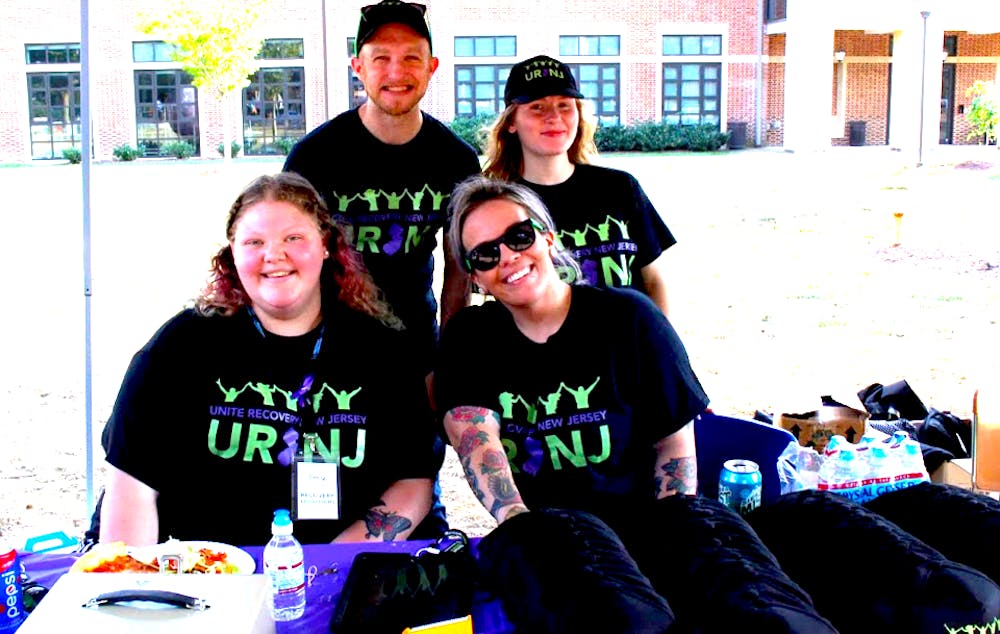By Sophie Popp
Correspondent
The College hosted the Unite Recovery New Jersey Rally on Saturday, Sept. 28, outside Trenton Hall. The event harbored a fun time for all with food, games and music.

The Coalition for Addiction Recovery Support hosted the event, where it focused on bringing people in the community and from all across New Jersey to rally together and celebrate people’s recovery processes.
Aaron Kucharski, an author and recovery advocate, spoke about his experience, his career and what recovery meant to him.
Kucharski wrote a book, titled “Elliot and Elliot: Awake in the Dark,” which is about a character who goes through his own self-discovery and challenges. He is currently working on another book titled “Vagrants & Vessels,” which is in its last stages of being edited.
Kucharski has been in recovery since Sept. 6, 2003, having just begun 16th year. During this time, he worked with New Jersey recovery organizations from 2010 to 2018.
To begin his speech, he highlighted what he and his community members have done to help people in recovery.
While he was with Unite Recovery New Jersey, he held trainings with members of the organization, as well as community events.
“We’ve created this culture of speaking out, that it’s OK to tell your story, it’s OK to talk about recovery, it’s OK to educate your decision-makers about what a collegiate recovery program is,” Kucharski said.
He said the model they have created in New Jersey that allows people to speak out and tell their story should be a model that other places around the country should follow.
“When you see actual change in communities, you see it from the ground up and you see it from the people and the community,” Kucharski said.
He gave an analogy about china plates and how they are stuck in the cabinet and never used for their actual purpose, and compared it to people having ideas about recovery but not going through with them. Kucharski highlighted the importance of having ideas that will help communities with recovery, but the fact is that it is necessary for people to implement them — they cannot remain in a cabinet and never be used.
“Everything that you guys need to make the change that you envision in your communities is inside of you,” Kucharski said.“Recovery has given me everything I need to create the life I want to live. If the recovery process is not giving you what you need or what the community needs, then you need to ask why and try and fix it.”
Kucharski also acknowledged points made by recovery historian William White, saying that recovery is not unattainable, but rather real and within the reach of people.
He also noted that each recovery process is different, saying that because people have different pathways, it is important to realize that individual recovery stories may be different.
Kucharski also pointed out that all the work that organizations are doing will not just affect people now, but also those recovering in the future.
“Can you create something that’s going to help people for generations of people that you are never going to meet in your life?” Kucharski said.
Heather Ogden, who is a recovery advocate, was not supposed to make it to the rally due to her college graduation. However, Ogden was in attendance and brought her whole family to the rally with her as well.
Members of the Unite Recovery New Jersey organization gave her flowers at the rally to show her how much they appreciate her dedication to the Unite Recovery New Jersey organization. Ogden praised her family for supporting her through her journey.
“These are the people that told me I could do this when I didn’t think that I could,” Ogden said. “If anyone tells you that can’t do it, or that you’re doing it wrong, they are the ones that are wrong.”
He ended his speech by telling people to get their ideas heard by talking to the elected officials in these organizations and starting a conversation.
“People need access to lifesaving care, people need access to continuing recovery support services,” Kucharski said. “We do not have the luxury to be quiet about these issues anymore.”







